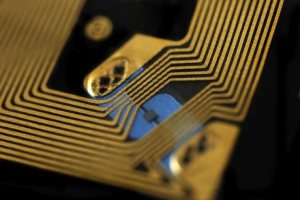



Date:10/02/16
 A team of computer experts from the Massachusetts Institute of Technology (MIT) has reportedly constructed a tech-savvy type of Radio Frequency Identification (RFID) chip that is impossible to hack. Alongside researchers from Texas Instruments, the group has already built and tested a number of prototypes that back up their assertions.
A team of computer experts from the Massachusetts Institute of Technology (MIT) has reportedly constructed a tech-savvy type of Radio Frequency Identification (RFID) chip that is impossible to hack. Alongside researchers from Texas Instruments, the group has already built and tested a number of prototypes that back up their assertions.
According to Chiraag Juvekar, an electrical engineering graduate at MIT and a co-author of the research, the new chip has been designed to curb so-called 'side-channel attacks' that can be used to steal the encryption keys contained in RFID technology.
"The idea in a side-channel attack is that a given execution of the cryptographic algorithm only leaks a slight amount of information," Juvekar told MIT News. "So you need to execute the cryptographic algorithm with the same secret many, many times to get enough leakage to extract a complete secret."
In light of this, Juvekar claims that his team was able to thwart side-channel attacks by regularly changing the secret encryption keys with the use of a random-number generator. A central-computer server would run the generator, and each time an RFID scanner queried the chip it would send the results back to the server to then validate the key, the research revealed.
"In the age of ubiquitous connectivity, security is one of the paramount challenges we face," said Ahmad Bahai, chief technology officer at Texas Instruments. "Because of this, Texas Instruments sponsored the authentication tag research at MIT that is being presented at ISSCC. We believe this research is an important step toward the goal of a robust, low-cost, low-power authentication protocol for the industrial internet."
MIT computer experts unveil RFID chip technology that is
 A team of computer experts from the Massachusetts Institute of Technology (MIT) has reportedly constructed a tech-savvy type of Radio Frequency Identification (RFID) chip that is impossible to hack. Alongside researchers from Texas Instruments, the group has already built and tested a number of prototypes that back up their assertions.
A team of computer experts from the Massachusetts Institute of Technology (MIT) has reportedly constructed a tech-savvy type of Radio Frequency Identification (RFID) chip that is impossible to hack. Alongside researchers from Texas Instruments, the group has already built and tested a number of prototypes that back up their assertions.According to Chiraag Juvekar, an electrical engineering graduate at MIT and a co-author of the research, the new chip has been designed to curb so-called 'side-channel attacks' that can be used to steal the encryption keys contained in RFID technology.
"The idea in a side-channel attack is that a given execution of the cryptographic algorithm only leaks a slight amount of information," Juvekar told MIT News. "So you need to execute the cryptographic algorithm with the same secret many, many times to get enough leakage to extract a complete secret."
In light of this, Juvekar claims that his team was able to thwart side-channel attacks by regularly changing the secret encryption keys with the use of a random-number generator. A central-computer server would run the generator, and each time an RFID scanner queried the chip it would send the results back to the server to then validate the key, the research revealed.
"In the age of ubiquitous connectivity, security is one of the paramount challenges we face," said Ahmad Bahai, chief technology officer at Texas Instruments. "Because of this, Texas Instruments sponsored the authentication tag research at MIT that is being presented at ISSCC. We believe this research is an important step toward the goal of a robust, low-cost, low-power authentication protocol for the industrial internet."
Views: 500
©ictnews.az. All rights reserved.Similar news
- Cellphone Use May Raise Cancer Risk
- Australian police pushes cyber safety education
- Vietnam aims to lead in e-government
- Senate Website Gets Hacked
- US builds net for cyber war games
- Japan enacts anti-computer virus law
- India passes law vs e-waste
- Anonymous Declares War On The City Of Orlando
- Microsoft highlights evolving dangers as online identity data proliferates
- Consumers want internet security to be provided by banks
- Government facilities targets of cyber attack
- South Korean web attacks might been war drill
- Sri Lanka to Establish National Passport Database to Increase Border Security
- Hi-tech crime agencies set to employ information security professionals
- Phone hacking and online campaign bring down the News of the World





















